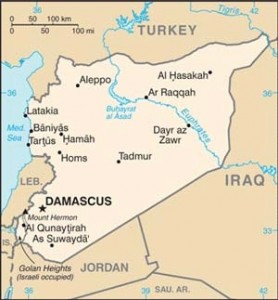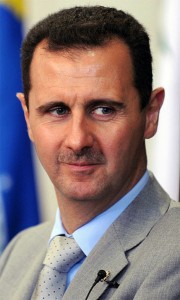Finally, the Obama administration may be demanding that its Mideast allies stop smuggling arms to jihadist rebels in Syria, a move that makes a negotiated settlement possible, says Gareth Porter.
By Gareth Porter
When Russian President Vladimir Putin had a substantive meeting with U.S. Secretary of State John Kerry last week, it was an extremely rare departure from normal protocol. Yet, there was some political logic to the meeting because Putin and Kerry have clearly been the primary drivers of their respective governments’ recent policies toward Syria and their negotiations have led to a stunningly successful Syrian ceasefire and possible Syrian negotiations on a political settlement.
Washington and Moscow had to cooperate in order to get that ceasefire along with the jump-starting of intra-Syrian negotiations, now scheduled to begin next month, according to United Nations special envoy Steffan de Mistura. But the diplomatic maneuvering did not involve equal influence on each other’s policies. Putin’s Russia has now demonstrated that it has effective leverage over the policy of Kerry and the United States in Syria, whereas Kerry has no similar leverage over Russian policy.
Kerry had appeared to be the primary driver of a political settlement last year, propelled by a strategy based on exploiting the military success of the Nusra Front-led opposition forces, armed by the United States and its allies, in northwestern Syria. Kerry viewed that success as a way of put pressure on both the Assad regime and its Russian ally to agree that President Bashar al-Assad would step down.
But that strategy turned out to be an overreach when Putin surprised the outside world by intervening in Syria with enough airpower to put the jihadists, including Al Qaeda’s Nusra Front, and their “moderate” allies on the defensive. Still in pursuing the U.S. strategy, we now know Kerry asked President Barack Obama to carry out direct attacks on Assad’s forces, so Kerry could have some “leverage” in the negotiations with the Russians over a ceasefire and settlement. But Obama refused to do so, and the Russian success, especially in January and February, conferred on Putin an even more clear-cut advantage in the negotiations with the United States over a Syrian ceasefire.
The agreement between Russian Foreign Minister Sergei Lavrov and Kerry also was more far-reaching than what has been made public and the ceasefire has proven to be far more effective than anyone had expected. It is now clear that the reason is that Putin was able to convert his new-found leverage into the one U.S. diplomatic concession that is necessary to any possibility of ending the war.
According to a report last week by Elijah J Magnier, who writes on regional politics and diplomacy for Al Rai, Kuwait’s leading daily newspaper, “high officials present in Syria” – which his report makes clear were Iranian – said the United States had pledged as part of the ceasefire deal to “enforce on its regional Middle Eastern allies the cessation of the flow of weapons” into Syria.
In response to an e-mail query from this writer, Magnier said he had learned from his sources that no weapons have crossed the border into Syria from either Turkey or Jordan since the ceasefire went into effect. This crucial element of the U.S.-Russian understanding, about which the Obama administration has maintained a discrete silence, evidently left the leadership of Nusra Front and its allies with little choice but to go along with the ceasefire for an indeterminate period.
The entire armed opposition has thus apparently been shut down in Syria on the insistence of the United States because it was a requirement for the Russians to halt the offensive against them.
That far-reaching U.S. concession explains why Putin surprised the entire world by announcing on March 14 that he was withdrawing the bulk of the Russian aircraft participating in the offensive. Contrary to the speculation of many pundits about his motive in doing so, Putin was actually enhancing his leverage over both the military situation and the political negotiations still to come. Magnier’s sources told him that when Putin had informed Iran of his intention to withdraw the planes, he had emphasized that they could be returned to Syria within 24 hours if necessary.
Magnier’s Iranian sources also made it clear that Iran was unhappy about the timing of Putin’s decisions on the ceasefire. They believed that it came at least a month too soon, just as Iranian forces were in a position to gain significantly more territory.
But Putin’s agreement to the ceasefire and partial withdrawal on condition that outside patrons would not move to resupply their clients served the larger Russian strategy of checkmating the aim of Turkey and Saudi Arabia of bringing down the Assad regime – an aim in which the United States had become deeply involved, even as it insisted it wanted to preserve the structure of the Syrian state security apparatus.
Coming after a demonstration of the effectiveness of Russian airpower in frustrating the 2015 ‘s jihadist-led offensive, Putin’s seizing the opportunity to nail down the agreement with Washington and then pulling out most of his airpower conveyed a message to the jihadists’ external patrons that it was in their interest not to restart the war.
By shifting the conflict to the negotiating table, Putin’s moves have also added to Russian leverage on the Assad regime, and the Russians can be expected to be active in suggesting ways to craft a Syrian agreement on new elections and constitutional reform. The Russians have ruled out any requirement for Assad to resign, but the Iranians are afraid that assurance is not ironclad. Iranian officials strongly hinted privately in Vienna that they believed the Russians made a deal with the United States on a key sanctions relief issue at Iran’s expense in the final stage of the nuclear negotiations. They fear something similar may happen on Syria.
Iran has long regarded Assad and his regime as a key in the “axis of Resistance,” so it views his removal from power under any formula as unacceptable. Magnier’s sources told him that Iran believes Putin would accept a formula under which Assad would name someone else to run for president in a future election, according to Magnier.
Once the negotiations reach that stage of the negotiations, however, Putin will have a range of options for compromise that wouldn’t require Assad’s withdrawal from the regime. In a new constitution, for example, Assad could assume the role of chief of state with more ceremonial functions and an “advisory” role, while policymaking powers are assumed by a prime minister. Such a compromise could be seen as preserving the legitimacy and stability of the present regime, even though Kerry could claim that the opposition’s main interest had been achieved.
Of course, despite the remarkable diplomatic leverage Putin has achieved, the negotiations could still fail. That could happen because the opposition’s negotiators are unwilling to agree to a settlement that appears to preserve the Assad regime more and because the Obama administration proves unwilling to compel its allies to maintain the arms supply suspension. But the longer the negotiations continue, the greater John Kerry’s personal stake in seeing them reach a compromise agreement and thus avoiding the resumption of full-scale war.
Gareth Porter is an independent investigative journalist and winner of the 2012 Gellhorn Prize for journalism. He is the author of the newly published Manufactured Crisis: The Untold Story of the Iran Nuclear Scare. [This article originally appeared at http://www.middleeasteye.net/columns/how-putins-leverage-shaped-syrian-ceasefire-403859331#sthash.1bWEuJNc.dpuf]


I am skeptical of Elijah J Magnier’s assertion he has talked to “Iranian officials”. Kuwait is a US colony, Iran purposely leaking to a Kuwaiti source is absurd. The juicy tidbit that the US has ordered Turkey/Jordan to shut down the border is could be true, but the rest seems dubious. I do not believe that Russia does not talk to Syria and Iran, that Iran believes Russia will betray Iran and Syria, certainly for Iran to talk this way would give their opponents critical advantage in negotiations. Anything but a united front by Syria/Russia/Iran makes no sense at all in negotiation, there is no reason for Iran to leak anything, particularly what’s in Magnier’s article, which most likely is a worthless piece of disinformation intended for ” domestic consumption” that is “us”.
AND THEN…?
Gareth Porter in the above article provides essential information for
a comprehension of the Syrian conflict.
Meanwhile, Syria with Russian air support has retaken Palmyra from
ISIS (not on the map) according to articles from Al Jazeera English.
And Aleppo?
Some are still committed to the anti- Assad or nothing which it
appears from this distance will be most likely be: nothing.nWho
are these people?
One wonders if Vladimir Putin finds his temporary changes
of position in Russia as a template. If he does, it is
perhaps unwise as Syria, not long ago was on the
verge of collapse, is not Russia which has not recently
been on the verge of collapse as a sovereign nation.
(Palmyra did not appear on the map…)
Turkish reaction was not covered.
Once more, extreme appreciation for an excellent
contribution.
—Peter Loeb, Boston, MA, USA
Fascinating theory! It seems to fit with what little I can learn from news reports – like the US of A actually attacking some ISIS targets instead of merely pretending to do so. And both Russia and the US seem to be sending arms to the Syrian Kurds, some of which naturally are filtering into the hands of their Kurdish cousins in Turkey.
One has to wonder if Erdogan’s head isn’t a shared goal of both nations now, especially with some Russian government people making some strange peace overtures to Turkey.
https://www.rt.com/politics/337165-turkey-must-accept-responsibility-for/
A different government in Turkey could easily dump the blame for everything onto Erdogan.